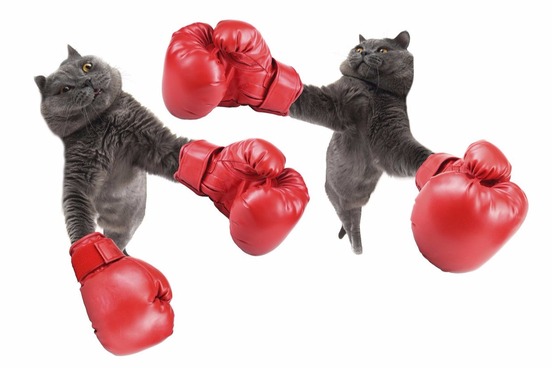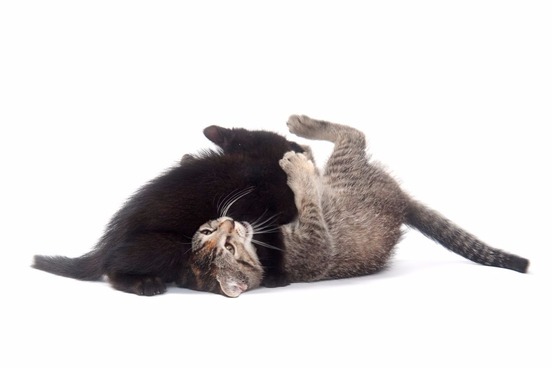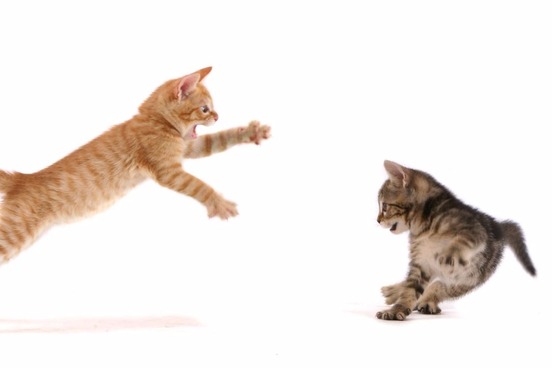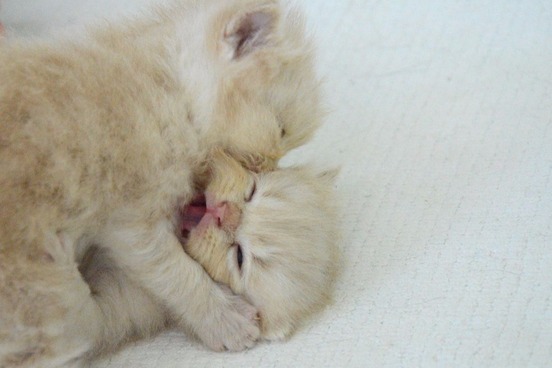
Saved by the bell
Its use as the title of a 1990s sitcom might make one think of high school and gigantic cell phones, but saved by the bell originated from boxing. A boxer getting pummeled is "saved by the bell" when the signal comes to end a round.
That phrase was used in boxing writing early in the 20th century, but by the second half of the century acquired a figurative application describe one who has been relieved from pressure or difficulty from an outside intervention.
"Rain in August meant we were saved by the bell and I expect an average German crop," [Stephan Barth] said, adding that along with U.S. crop there would be "sufficient market supply" although prices would remain high.
Reuters, 4 Sept. 2017

Palooka
Palooka is a classic term for an inexperienced or incompetent boxer, one who has no business being in the ring. More broadly, it can mean any oaf or lout.
I suppose truth was the winner, but it was messy; by the end it was like watching Mike Tyson in his prime beating up some tank-town palooka in a grudge match where the ref refused to stop the fight.
— Stephen King, Entertainment Weekly, 30 July 2010
Joe Palooka was the name of a comic strip created by Ham Fisher that was first published in 1930, and many have naturally assumed that its title character, a gentle-hearted prizefighter, was the source of the term palooka. However, the word had been around for at least ten years before the debut of the strip, and the word's true origins are unknown.

No holds barred
No holds barred was a phrase used to advertise free-form wrestling matches, where no grips were illegal, as far back at the late 19th century.
The adverbial phrase no holds barred or with no holds barred has come to mean "free from the usual limits or rules." It can also be an adjective, usually hyphenated:
Later, Hart honed his knack for emotional brutality. The roiling, acoustic-based “Never Talking To You Again” is a crisp and no-holds-barred kiss-off toward an ex, while “Don’t Want To Know If You Are Lonely” is about the tortured aftermath of a breakup that’s difficult to let go.
— Annie Zaleski, Salon, 14 Sept. 2017

On the ropes
A modern boxing ring is bounded on all four sides by ropes fastened together at the corners by turnbuckles. Even though the combat area is square, the term ring remains as a holdover from when combat contests would be held in circular spaces.
A boxer who is backed against the ropes has nowhere further to retreat, and so risks being pummeled and knocked out. Figuratively, one who is on the ropes is similarly in a helpless or defensive position, usually close to defeat:
Even Robert Dole's closest advisers say that Dole will be on the ropes if he loses to George Bush in Iowa and New Hampshire.
— Elizabeth Drew, The New Yorker, 21 Dec. 1987

Fistic
The adjective fistic means "of or relating to boxing or fighting with the fists," and while it sees humorous use in sports publications, the Oxford English Dictionary labels it "not in dignified use." Perhaps the adjective pugilistic, derived from a Latin word for "boxer" (pugil), is more suitable for the profession.
Some police departments, particularly those in and around Louisiana, use the phrase fistic encounter in their reports. Our word fisticuffs derives from an alteration of fistic combined with cuffs.
Showtime Sports will televise the spectacle on pay-per-view and is setting its sights on the record 4.6 million buys for Mayweather's 2015 bout with Manny Pacquiao. Given the crossover appeal for MMA fans - not to mention those who like to watch lions fighting bears on nature videos - it's reasonable to believe this fistic happening will reach its goal.
— Jeff Wagenheim, The Washington Post, 15 June 2017

Heavyweight & Lightweight
Professional boxers are classified into one of 17 weight classes, with category limits varying slightly across the sport's different sanctioning bodies. Heavyweight generally refers to the heaviest classification, for which there is no upper limit, and in general use can mean "one that possesses great power, prominence, or stature."
Lightweight is not the lowest classification—the flyweight and the bantamweight are among those that rank below it—but that didn't stop the word from develop its own meaning in general use, "one of little consequence or ability."
As a cultural event the Oscars thrive on prestige, celebrity gloss, emotion and surprise. With cinematic heavyweights like Martin Scorsese accounted for - and Woody Allen and Terrence Malick in the conversation, if not in the room - and star wattage from George, Brad and Meryl, cachet and glamour should be easy gets.
— Melena Ryzik, The New York Times, 23 Feb. 2012But if Evelyn was skeptical, from an early age, of Arthur's Victorian meliorism, his bleak view of humanity was undoubtedly made bleaker by the conduct of his first wife, who left him, without warning, for a man Waugh and everyone else in their circle regarded as a lightweight.
— Evelyn Toynton, Harper's, August 2007

Go to the mat
Go to the mat originated from wrestling, the mat being the padded canvas on the floor of a ring. The phrase can be interpreted as simply entering the ring to begin a bout, but since a match isn't over until a wrestler is pinned to the ground, some interpret go to the mat to mean "to continue grappling even after leaving one's feet."
That notion of fighting to the finish gives go to the mat its figurative meaning of "to engage in a prolonged struggle."
In 1990 the president of Michigan State University, John DiBaggio, went to the mat trying to prevent the school's football coach from also being named its athletic director. DiBiaggio had the strange thoughts that values might be compromised and that a nationwide equal opportunity search was desirable.
— Andrew Zimbalist, Unpaid Professionals, 1999

Throw in the towel
When someone wanted to end a boxing match, the person who threw in the towel usually wasn't the boxer, who was getting pummeled, but the boxer's trainer. The toss of a towel, used to wipe up sweat or blood, into the ring would signal to the referee that the fight was over. (A lesser-used variant of the idiom is throw in the sponge).
To throw in the towel now means to quit something, usually when one is failing at it.
Trainor is good at his job. After a four-year battle, the Texas Ethics Commission threw in the towel, giving up its fight to force Empower Texans to disclose its donor rolls.
— Amanda Marcotte, Salon, 18 Sept. 2017





